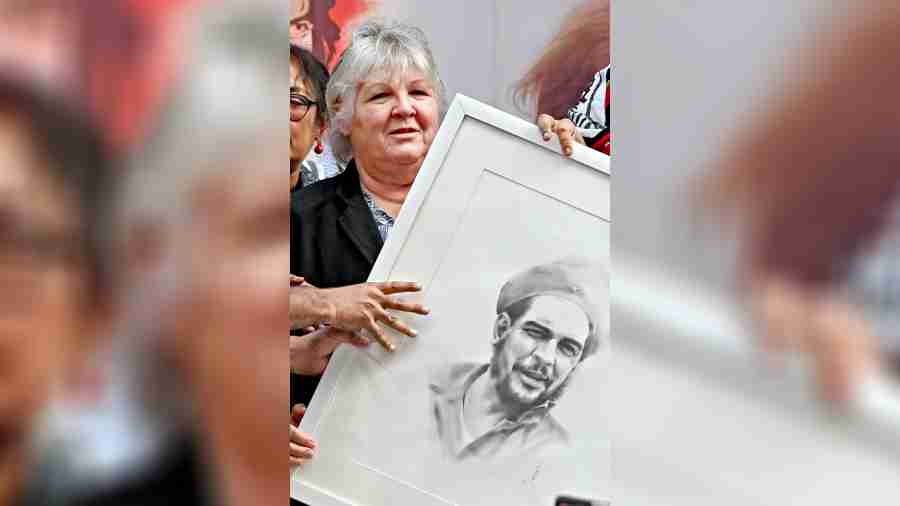Ernesto Che Guevara came to India in 1959. Yes, the very Che who is the Argentina-born patron saint of the Cuban revolution and trusted lieutenant of Fidel Castro. That very Marxist revolutionary leader who has been the icon of rebellion for India’s angry young for some generations now. Last month, Che’s daughter Aleida Guevara March came to Calcutta.
The Calcutta leg of Aleida’s trip took off at the Indian Statistical Institute (ISI) in Bonhooghly on the northern fringes of the city and was marked “private” by her tour planners at the National Committee for Solidarity with Cuba in India, a voluntary civil society organisation primarily influenced by the CPI(M). Her father too had visited the ISI, 63 years ago.
In Socialism and Man in Cuba, Che wrote, “The leaders of the revolution bear children who do not learn to say father with their first stammers.” Aleida was seven when her father was captured and tortured to death while leading a guerrilla group against the Bolivian army in the Andes. Her mother, after whom she has been named, was Che’s second wife.
Aleida Sr had been a 20-year-old combatant from the provinces of Cuba when she met Che. In Remembering Che: My Life with Che Guevara, she recalls one night when she and Che went out for a walk along a highway. She writes, “He scrutinised everything and I took notes like a good assistant. He told me we had to locate a ‘Caterpillar’, a bulldozer, in order to lift the railroad tracks to derail the dictator’s armoured train that was expected to arrive... I didn’t understand what he had said. I had no idea what a Caterpillar was — he used the word ‘Caterpillar’ in English — so I noted down what I thought he had said in Spanish: ‘catres, palas y pilas [beds, shovels and batteries]’... Years later, when I told our children this story, they enjoyed taunting me, chanting: ‘Beds, shovels and batteries!’”
Che had been a medical doctor. He had travelled the length of South America as a part of his self-devised “internship” trip along with another would-be doctor and That was in 1952. The experience constitutes the book The Motorcycle Diaries. After returning from that trip, he was aflame with revolution, and turned Communist.
Aleida Jr is a doctor too, based in the Cuban capital of Havana and an active member of the Communist Party there. The 62-year-old is a paediatrician, social worker and human rights advocate. She is also a member of the Cuban Medical Mission, which works to improve children’s health in Latin America and some developing countries.
Aleida was invited to India by the K.R. Gouri Amma Foundation, named after a prominent leader of the Left movement from Kerala. She also visited Tamil Nadu, Telangana, Andhra Pradesh and Bengal.
At the time of his India trip, Che had been the minister of industries in Cuba. He led a delegation of eight comrades to meet Jawaharlal Nehru and see for themselves a young nation and its development a decade after its Independence.
Those days, the ISI was a muststop for visiting heads of state and luminaries from across the world. China’s Zhou Enlai, Vietnam’s Ho Chi Minh, Soviet leader Alexei Kosygin... all visited the institute at some point in time to see how a developing country’s economy was being planned based on statistical surveys and research.
Cut to the ISI of 2023. After some revolutionary Spanish songs and a Rabindrasangeet, Aleida took the stage to address the gathering of scientists and comrades. She spoke about the photographs of her father on display at the ISI, and how she was surprised to see them.
The chief librarian of the ISI, Kishore Chandra Satpathy, described them, “In the first one, Che is at the electronic computer division looking at URAL and HEC2M, the first two computers to arrive in India. In the second, he is at the ISI’s Kalyanshree unit established for underprivileged women. And in the third, he is at a research and development workshop at the institute.” Aleida said to the gathering, “My father came here to understand how statistics can be applied for the benefit of the poor in India...”
The Telegraph’s question to Aleida had to do with the Cuban public healthcare system. Debrup Chakraborty, who is a cryptologist and faculty member at ISI, translated it from English to Spanish for her. Aleida started talking about how Cuba built its healthcare system, which survived the Covid-19 pandemic despite the longstanding US economic blockade or “trade embargo”. She said, “The blockade prevents us from getting life-saving medicines patented in the US, the latest scientific technology and even infant formula milk.”
She stressed the strength of the healthcare system that gives preventive treatment — through free vaccination of all children against as many as 14 diseases. “We are trying to apply statistics to understand the diseases prevalent in our island and find alternative avenues to prevent and treat them,” she added.
Any message for the youth here who venerate Che? Amidst the hustle and bustle at the ISI, there was little time to ask this, but turns out someone everywhere wants to know this. At an open forum for students on College Square, Aleida said, “Practise the principles of Che Guevara and learn from his hardship and struggle.”
Basically meaning, don’t just put his face on wall hangings and coffee cups. Walk the revolution. Be the revolution.

